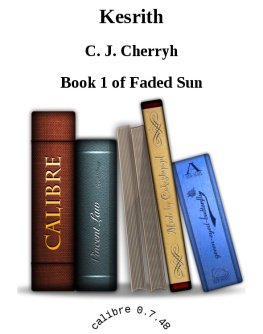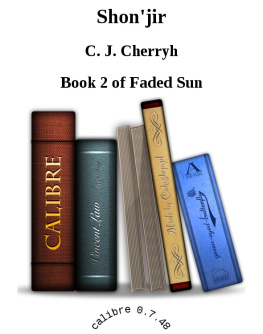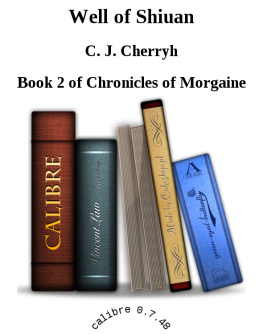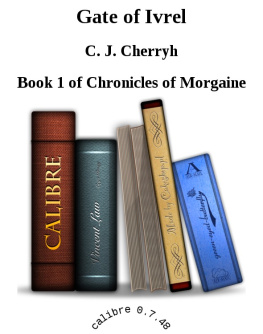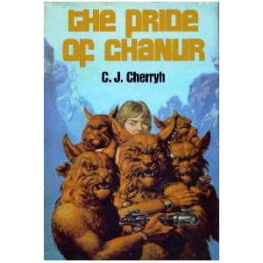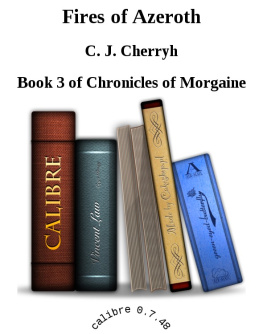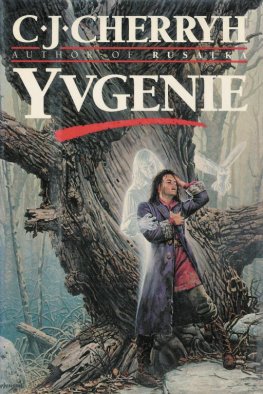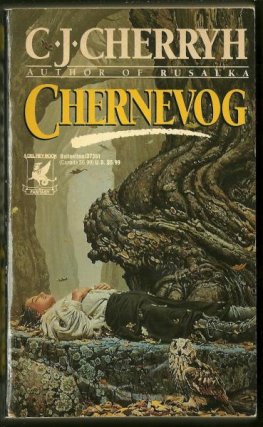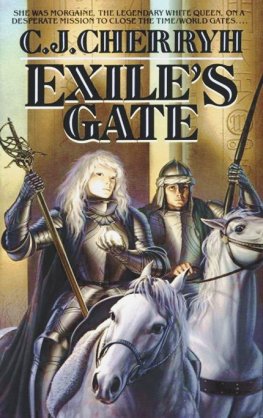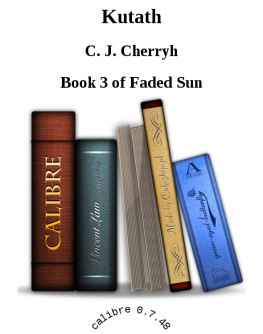Annotation
COPYRIGHT , 1978, BY C. J. CHERRYH
All Rights Reserved
Cover art by Gino D'Achille
Frontispiece sketch by the Author
For DON WOLLHEIM with most especial appreciation
FIRST DAW PRINTING, AUGUST 1978 123456789
PRINTED IN U. S. A.
C. J. Cherryh
The Faded Sun: Kesrith
Chapter ONE
Wind-child, sun-child, what is Kath?
Child-bearers, laugh-bringers, that is Kath.
IT WAS a game, shon'ai, the passing-game, Kel-style, in the dim round hall of the Kel, the middle tower of the House black-robed men and a black-robed woman, a circle of ten. Warriors, they played the round not like children, with a pair of stones, but with the spinning blades of the as'ei, that could wound or kill. On the name-beat, the snap of fingers, the as'ei flew across the seated circle of players, and skilled hands seized the hilts in mid-turn, to beat the time and hurl the blades on in the next name-beat.
Fire-child, star-child, what is Kel?
Sword-bearers, song-weavers, that is Kel.
They played without words, with only the rhythm of their hands and the weapons, flesh and steel. The rhythm was as old as time and as familiar as childhood. The game had more meaning than the act, more than the simplicity of the words. The Game of the People, it was called.
Dawn-child, earth-child, what is Sen?
Rune-makers, home-leaders, that is Sen.
A kel'en who flinched, whose eye failed or whose wits wandered, had no value in the House. The boys and girls and women of the Kath played with stones to learn their skill. Those who became kel'ein played thereafter with edged steel. The Kel, like the mothers and children of the gentle Kath, laughed as they played. They of Kel-caste were brief and bright as moths. They enjoyed life, because they knew this.
Then-child, now-child, what are we?
Dream-seekers, life-bearers, we are_
A door opened, echoing, the sound rolling through the hollows and depths of the tower. Sen Sathell broke in upon them, suddenly and without warning or courtesies.
The rhythm ceased The blades rested in the hands of Niun, the youngest kel'en. The Kel as a whole inclined their heads in respect to Sathell s'Delas, chief of Sen-caste, the scholars. Gold-robed he was, like light breaking into the dark hall of the martial Kel, and he was very oldthe oldest man of all in the House.
"Kel'anth, " he said quietly, addressing Eddan, his counterpart in the Kel, "kel'einnews has come. The rumor is the war has ended. The regul have asked the humans for peace. "
There was utter silence.
An abrupt move. The as'ei whirred and buried points in the painted plaster of the far wall.
The youngest kel'en rose and veiled himself, and stalked from the gathering, leaving shock in his wake.
The sen'anth and the kel'anth looked at each other, old men and kinsmen, helpless in their distress.
And from the deepest shadows one of the dusei, a brown, slope-shouldered mass larger than a man, stirred and rose, ambling forth into the light in that mournful, abstracted manner of dusei. It pushed its way irreverently between the two elders, thrusting its massive head at the kel'anth, who was its master, seeking comfort.
Kel'anth Eddan patted the beast with age-smooth fingers and looked up at the old scholar who, outside the divisions of caste and duty, was his half-brother. "Is the news beyond any doubt?" he asked, the least trace of hope yet remaining in his voice.
"Yes. The source is regul official communications, no city rumor. It seems completely reliable. " Sathell gathered his robes about him and, tucking them between his knees, settled on the carpeted floor among the kel'ein, who eased aside to make room for him in their circle.
They were, these ten, the elders of the House, save one.
They were mri.
In their tongue, when they made this statement, they were merely saying that they were of the People. Their word for other species was tsi'mri, which meant not-people, and summed up mri philosophy, religion, and the personal attitudes of the elders at once.
They were, as a species, golden-toned. Mri legends said that the People were born of the sun: skin, eyes, coarse shoulder-length manes, all were bronze or gold. Their hands and feet were narrow and long, and they were a tall, slender race. Their senses, even in great age, were very keen, their hearing in particular most sensitive. Their golden eyes were lid-folded, double-lidded as well, for a nictitating membrane acted on reflex to protect their vision against blowing dust.
They were, as outsiders believed, a species of warriors, of mercenariesfor outsiders saw the Kel, and rarely the Sen, and never the Kath. Mri served outsiders for hireserved the regul, the massive tsi'mri merchants native to Nurag of the star Mab. For many centuries, mri kel'ein had hired out to protect regul commerce between-worlds, generally hired by one regul company as defense against the ambitions and ruthlessness of some business rival, and mri had therefore fought against mri. Those years and that service had been good for the People, this trying of one kel'en of a certain service against the kel'en of another, in proper and traditional combat, as it had always been. Such trials-at-arms refined the strength of the People, eliminating the weak and unfit and giving honor to the strong. In those days the tsi'mri regul had recognized themselves to be incapable of fighting and unskilled in planning strategies, and sensibly left all matters of conflict to the mri Kel to settle in the mri fashion.
But for the last forty years, mri had served all regul combined against all humans, a bitter and ugly conflict, lacking honor and lacking any satisfactions from the enemy. The mri elders were old enough to remember the life before, and knew therefore what changes had been wrought by the war; and they were not pleased with them. Humans were mass-fighters, animals of the herd, and simply understood no other way of war. Mri, who fought singly, had early suspected this, tested it with their lives, found it bitterly true. Humans rejected a'ani, honorable combat, would not respect challenge, understood nothing but their own way, which was widespread destruction.
Mri had bent themselves to learn humanity, the way of the enemy, and had begun to adjust their operations and their manner of service to the regul accordingly. Mri were professionals when it came to combat. Innovation in the yin'ein, the ancient weapons that were used in a'ani, was dishonorable and unthinkable; but innovation in the zahen'ein, in modern arms, was a simple matter of retooling and adjusting methods, a matter of competency in the profession they followed for a livelihood.
Regul, unfortunately, were not as capable of adapting to new tactics. Regul had vast and accurate memories. They could not forget what had always occurred, but conversely they could hardly conceive at all of what had not yet happened, and did not make plans against it happening. Hitherto the regul had depended on mri entirely in the matter of their personal safety, and mri foresight ? for mri could imagine ? had shielded them and compensated for that regul blindness to the unexpected; but in latter days, when the war began to take regul lives and threaten regul properties, regul took matters into their own unskilled hands. Regul issued orders, prudent in their own estimation, for actions which were militarily impossible.
The mri had attempted to obey, for honor's sake.
Mri had died in their thousands, for honor's sake.
In the House, on this world, there lived only thirteen mri. Two were young. The rest were the makers of policy, a council of the old, the veteran. Long centuries ago the House had numbered more than two thousand in the Kel alone. In this present age all but these few had gone their way to the war, to die.

